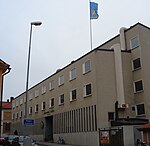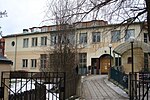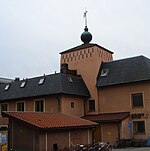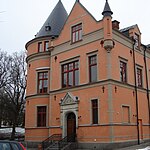Västmanlands-Dala Nation, Uppsala
1639 establishments in SwedenAlvar Aalto buildingsEurope university stubsFunctionalist architectureModernist architecture in Sweden ... and 3 more
Nations at Uppsala UniversityStudent organizations established in the 17th centurySwedish school stubs

Västmanlands-Dala nation, mostly referred to only as V-Dala, is one of the 13 student nations at Uppsala University in Sweden. The nation, intended for students from the provinces of Dalarna and Västmanland – these provinces making up most of the diocese of Västerås – was founded in 1639. The first inspektor of the nation was Olof Rudbeck the Elder, appointed in 1663. The current inspektor (as of 2016) is Peter Wallensteen, professor, Department of Peace and Conflict Research, Uppsala University.
Excerpt from the Wikipedia article Västmanlands-Dala Nation, Uppsala (License: CC BY-SA 3.0, Authors, Images).Västmanlands-Dala Nation, Uppsala
Sankt Larsgatan, Uppsala Fjärdingen
Geographical coordinates (GPS) Address External links Nearby Places Show on map
Geographical coordinates (GPS)
| Latitude | Longitude |
|---|---|
| N 59.860208333333 ° | E 17.628611111111 ° |
Address
Västmanlands-Dala nation (V-Dala)
Sankt Larsgatan 13
753 11 Uppsala, Fjärdingen
Sweden
Open on Google Maps









